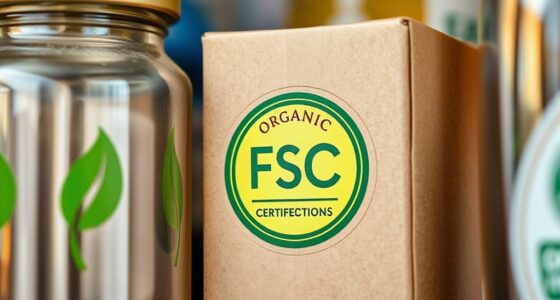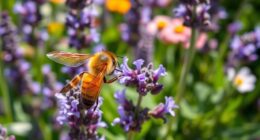Turning kitchen scraps into garden gold is simple with a worm composting system. Start by choosing a well-ventilated bin with drainage, add bedding like shredded paper, and introduce red wiggle worms. Feed them vegetable scraps, coffee grounds, and eggshells, avoiding meat and dairy. Keep the environment moist and aerated, and regularly check and turn the bedding. Soon, you’ll be harvesting nutrient-rich castings that will boost your garden. Keep going to discover more easy composting tips.
Key Takeaways
- Use a well-ventilated, drainage-equipped compost bin or worm bin suited for kitchen scraps.
- Add bedding materials like shredded paper or coconut coir to maintain moisture and habitat.
- Feed worms vegetable peels, coffee grounds, and eggshells, avoiding meat and dairy to prevent odors.
- Regularly check moisture levels; keep bedding damp like a sponge and turn it for aeration.
- Harvest nutrient-rich castings to enrich garden soil and promote healthy plant growth.

Composting might seem complicated at first, but it’s actually simple once you understand the basics. Whether you’re just starting out or looking to refine your process, one effective method is worm composting. Worm composting, also known as vermicomposting, uses worms to break down organic waste quickly and efficiently. It’s an excellent choice if you want a tidy, odor-free way to compost indoors or in small spaces. To get started, your first step is selecting the right compost bin. Picking a good compost bin is vital because it sets the foundation for successful worm composting. Look for a bin that has proper ventilation, drainage, and enough space to create an ideal environment for your worms. Many commercial worm bin options are available, but you can also DIY one with plastic containers or wooden boxes. Just make sure the bin has a lid to keep pests out and prevents excess moisture loss. When choosing a compost bin for worm composting, consider the size and your available space. Smaller bins are perfect for indoor setups or limited areas, while larger ones work well outdoors. The key is to have a bin with a secure lid and drainage holes at the bottom to prevent water buildup, which can harm your worms. Once you’ve selected your bin, the next step is setting it up properly. Add bedding material like shredded newspaper, cardboard, or coconut coir, which helps maintain moisture and provides a habitat for the worms. Then, introduce your worms—red wigglers are the best choice for composting—they’re hardy, fast breeders, and thrive in bin environments. After that, you’re ready to feed your worms with kitchen scraps such as vegetable peels, coffee grounds, and eggshells. Avoid adding meat, dairy, or oily foods, as these can cause odors and attract pests. Regularly check the moisture level in your bin; it should feel like a damp sponge—moist but not soggy. Turn the bedding gently every few weeks to aerate and distribute moisture evenly. As your worms consume the waste, they produce nutrient-rich castings that can be harvested and used directly in your garden. This process not only reduces waste but also creates a natural fertilizer that enhances your plants’ growth. With consistent maintenance, worm composting can transform your kitchen scraps into garden gold, enriching your soil and supporting healthy plant development. So, don’t worry about complexity—by selecting the right compost bin and providing a suitable environment for your worms, you’ll be composting efficiently and sustainably in no time.
Frequently Asked Questions
How Long Does It Take for Compost to Fully Mature?
The compost maturity timeline varies depending on factors affecting composting, like temperature, moisture, and aeration. Typically, it takes about 3 to 6 months for your compost to fully mature if conditions are ideal. You’ll know it’s ready when it looks dark, crumbly, and earthy, with a pleasant smell. Regularly turning your pile speeds up the process, helping you get nutrient-rich compost for your garden faster.
Can I Compost Meat and Dairy Products Safely?
You can compost meat and dairy products, but it’s not always safe or recommended due to odors and pests. Meat composting and dairy disposal attract critters, so if you choose to do it, use a hot compost bin and bury these items deep. Otherwise, consider alternative disposal methods. Always balance your compost with browns and greens, and monitor carefully to prevent issues.
What Are Common Pests Attracted to Compost Bins?
Imagine pests as unwelcome guests at your garden party. You spot ants, flies, or rodents around your compost bin—that’s a sign you need pest prevention. To keep these visitors at bay, practice regular compost monitoring, turning your pile often and avoiding meat or dairy scraps. Properly layered compost and maintaining the right moisture level make your compost less attractive, ensuring your garden remains a pest-free paradise.
How Do I Troubleshoot Foul Odors in My Compost?
When your compost smells foul, it’s usually due to excess moisture or nitrogen-rich materials. To fix this, improve odor control by turning the pile regularly and adding composting additives like dry leaves or shredded paper to balance moisture and carbon. Guarantee proper aeration, avoid overfeeding with kitchen scraps, and keep the compost moist but not soggy. These steps help create a healthy environment and eliminate unpleasant odors.
Is It Possible to Compost in Small Apartments or Indoors?
Did you know that nearly 38% of food waste can be composted indoors? Yes, you can definitely do apartment composting or indoor composting successfully. With a compact bin and proper ventilation, it’s easy to manage kitchen scraps without odors or pests. Just keep the balance of greens and browns, and turn your waste into nutrient-rich soil right in your apartment. Indoor composting makes eco-friendly living simple and convenient!
Conclusion
Now that you know how simple composting is, imagine the lush, vibrant garden you’ll nurture from your kitchen scraps. Every peel and leftover can become a gift to your plants, transforming waste into life. Don’t let this opportunity slip away—embrace composting and watch your garden blossom with health and vigor. Like a magic wand in your hands, compost turns ordinary waste into extraordinary beauty. Start today, and let nature’s miracle unfold right at your doorstep.









